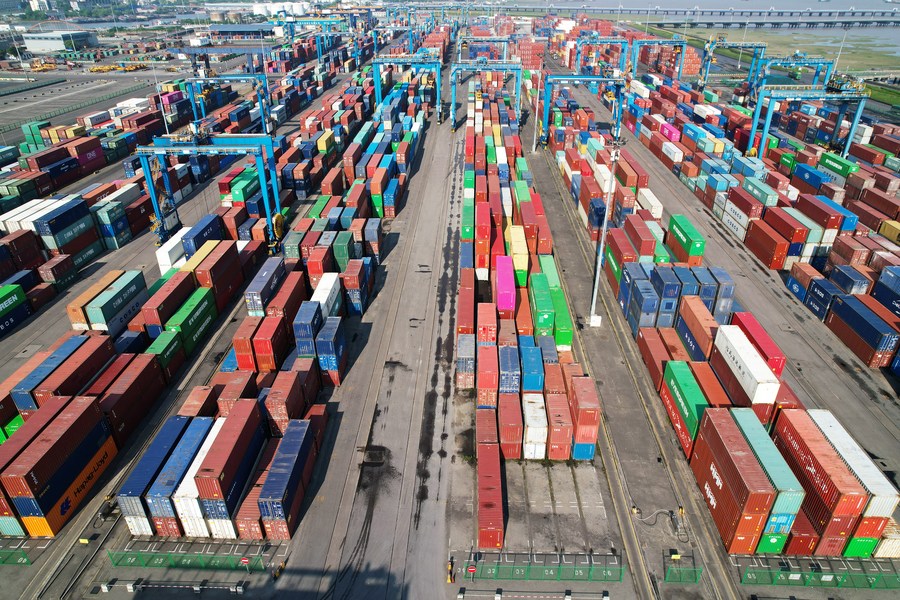China’s 2021-2025 foreign trade development plan highlights innovative development

Aerial photo taken on July 13, 2021 shows a container terminal in Jiaxing, east China's Zhejiang Province. (Photo by Long Wei/Xinhua)
BEIJING, Nov. 26 (Xinhua) --The plan for high-quality development of foreign trade during the 14th Five-Year Plan period (2021-2025) released Wednesday by China's Ministry of Commerce (MOC) underscores innovation development and transformation in foreign trade mode.
The plan outlined 45 key tasks in 10 categories, involving the structure of goods trade, innovation in service trade, new modes of foreign trade, and better risk control system.
China's foreign trade staged a stellar performance in the first three quarters, with total imports and exports expanding 22.7 percent year on year to 28.33 trillion yuan (about 4.43 trillion U.S. dollars), beating market expectations and playing a bigger part in driving growth.
Data withthe MOC shows that China's total value of trade in goods and services jumped to the first place ofthe world in 2020. Among them, the total value of trade in goods reached 4.65 trillion U.S. dollars. China has maintained its status as the largest goods trade country since 2017. The total value of trade in services reached 661.7 billion U.S. dollars, ranking second in the world.
Experts pointed out that as China's foreign trade volume grew rapidly, the risks and challenges it faces has kept accumulating. The innovative development of foreign trade is the only way to conform to the development trend of international trade and enhance the comprehensive competitiveness of foreign trade, and is also an important measurefor Chinato stabilize foreign trade.
The macro risks of China's foreign trade development cannot be ignored, including the weak foundation of world economic recovery, the rise of unilateralism and protectionism, the rising global inflation, and the accelerated restructuring of the international industrial chain and supply chain, said Ren Hongbin, Vice Minister of Commerce.
The plan puts the deepening of technological innovation, system innovation and mode innovation in a prominent position, and proposes vigorously developing digital trade, improving the development mechanism of service trade, promoting the sustainable and healthy development of cross-border e-commerce, advancing the development of market procurement trade methods, and supporting offshore trade development.
Li Wenlong, Dean of Pan-Asia Research Institute of Digital Economy,said that new business mode is a vital force in the development of China's foreign trade, which is also an important trend in the development of international trade, and an important measure to ensure stable and high-quality development of foreign trade.
Li Xingqian, head of the MOC's foreign trade department,noted that the MOC will implement classified policies in terms of improving the policy system, creating a sound environment and enhancing service levels, so as to promote the flexible upgrade of the foreign trade supply chain and improve trade efficiency.
For example, the MOC will work with relevant departments to push forward the expansion of a new batch of cross-border e-commerce comprehensive pilot zones. Meanwhile, the MOC will support the development of offshore trade in Hainan Free Trade Zone and other qualified cities and regions, and promote the establishment of national or regional offshore trade industry organizations, Li Xingqian said.
The plan proposes innovating service trade and improvingthe development mechanism of service trade, advancing the openness of service trade, and establishing and strengthening the negative list management system for cross-border service trade.
"The MOC will comprehensively deepen the pilot service trade innovative development, explore the construction of a national service trade innovative development demonstration zone and promote implementation of the cross-border service trade negative list throughout the country”, said Ren Hongbin, adding that the MOC will also upgrade the comprehensive competitiveness of traditional service trade such as tourism, transportation and construction, encourage the import of technologies and services such as energy conservation and carbon reduction, environmental protection, and ecological governance, and adhere to the green and low-carbon development of service trade.


